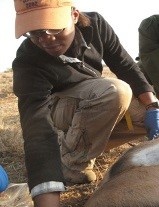Helminth-microbe co-infection: insights from a natural system

Vanessa Ezenwa
University of Georgia, GA, USA
vezenwa@uga.edu
Co-infection with worms can have profound effects on a host’s response to microbes, and an increasing number of studies are investigating the consequences of worm-microbe co-infection in laboratory settings. To better understand the dynamics of co-infection in natural systems, we used a free-ranging population of African buffalo to explore the consequences of worm infection for bovine tuberculosis (BTB). We followed 200 animals for four years to test the effects of anthelmintic treatment and natural worm resistance on individual and population-level outcomes of BTB infection. We found that de-worming had no effect on individual risk of infection, but enhanced survival of BTB-infected individuals, translating into a higher basic reproductive number for BTB with treatment. Natural worm resistance also had no effect on individual risk, but buffalo that were naturally worm-free were more likely to die of BTB in-fection. The distinct effects of de-worming versus natural resistance on BTB severity arise from differences in BTB dissemination in the body. Our work shows that different ways of being worm-free (i.e. artificial treatment vs. natural resistance) have distinct outcomes for mi-crobial co-infection.
Recent publications:
Ezenwa, V.O. and Jolles, A.E. 2015. Science, in press.
Nunn, C.L., Brezine, C., Jolles, A. E., Ezenwa, V. O. 2014. American Naturalist, 183: 494-505.
Jolles, A. E., Ezenwa, V. O., Etienne, R.S., Turner, W. and Olff, H. 2008. Ecology, 89:2239-2250.
Contact: benjamin.roche@ird.fr
Contact du Comité SEEM: seem@services.cnrs.fr. Appel à conférenciers février – avril 2015: http://goo.gl/forms/3m3vXLlWbc


